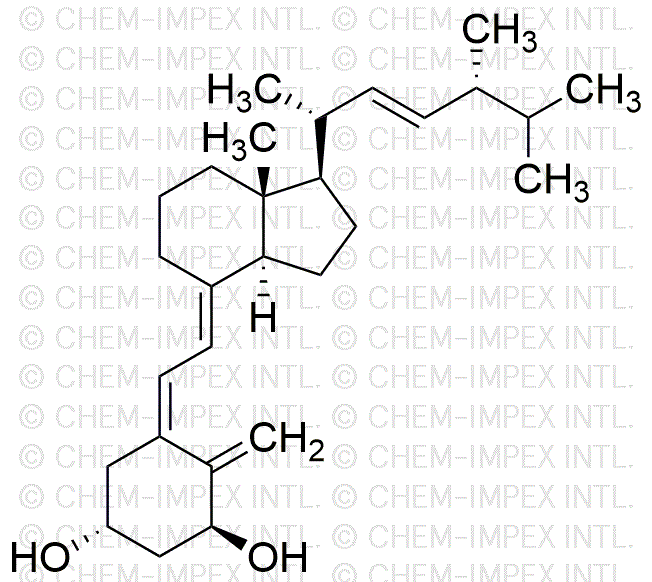Doxercalciferol is widely utilized in research focused on:
- Chronic Kidney Disease Management: This compound is primarily used to manage secondary hyperparathyroidism in patients with chronic kidney disease, helping to regulate calcium and phosphate levels effectively.
- Bone Health Research: Researchers study its effects on bone mineralization and density, making it valuable in osteoporosis studies and treatments aimed at improving bone health.
- Endocrine System Studies: Doxercalciferol plays a crucial role in research related to vitamin D metabolism and its effects on the endocrine system, providing insights into hormonal regulation.
- Pharmaceutical Development: It is an important compound in the development of new medications targeting vitamin D deficiency, offering potential advantages over traditional vitamin D therapies.
- Clinical Trials: Frequently used in clinical trials to evaluate its efficacy and safety in various patient populations, contributing to evidence-based medicine and improved patient outcomes.
General Information
Properties
Safety and Regulations
Applications
Doxercalciferol is widely utilized in research focused on:
- Chronic Kidney Disease Management: This compound is primarily used to manage secondary hyperparathyroidism in patients with chronic kidney disease, helping to regulate calcium and phosphate levels effectively.
- Bone Health Research: Researchers study its effects on bone mineralization and density, making it valuable in osteoporosis studies and treatments aimed at improving bone health.
- Endocrine System Studies: Doxercalciferol plays a crucial role in research related to vitamin D metabolism and its effects on the endocrine system, providing insights into hormonal regulation.
- Pharmaceutical Development: It is an important compound in the development of new medications targeting vitamin D deficiency, offering potential advantages over traditional vitamin D therapies.
- Clinical Trials: Frequently used in clinical trials to evaluate its efficacy and safety in various patient populations, contributing to evidence-based medicine and improved patient outcomes.
Documents
Safety Data Sheets (SDS)
The SDS provides comprehensive safety information on handling, storage, and disposal of the product.
Product Specification (PS)
The PS provides a comprehensive breakdown of the product’s properties, including chemical composition, physical state, purity, and storage requirements. It also details acceptable quality ranges and the product's intended applications.
Certificates of Analysis (COA)
Search for Certificates of Analysis (COA) by entering the products Lot Number. Lot and Batch Numbers can be found on a product’s label following the words ‘Lot’ or ‘Batch’.
*Catalog Number
*Lot Number
Certificates Of Origin (COO)
This COO confirms the country where the product was manufactured, and also details the materials and components used in it and whether it is derived from natural, synthetic, or other specific sources. This certificate may be required for customs, trade, and regulatory compliance.
*Catalog Number
*Lot Number
Safety Data Sheets (SDS)
The SDS provides comprehensive safety information on handling, storage, and disposal of the product.
DownloadProduct Specification (PS)
The PS provides a comprehensive breakdown of the product’s properties, including chemical composition, physical state, purity, and storage requirements. It also details acceptable quality ranges and the product's intended applications.
DownloadCertificates of Analysis (COA)
Search for Certificates of Analysis (COA) by entering the products Lot Number. Lot and Batch Numbers can be found on a product’s label following the words ‘Lot’ or ‘Batch’.
*Catalog Number
*Lot Number
Certificates Of Origin (COO)
This COO confirms the country where the product was manufactured, and also details the materials and components used in it and whether it is derived from natural, synthetic, or other specific sources. This certificate may be required for customs, trade, and regulatory compliance.


